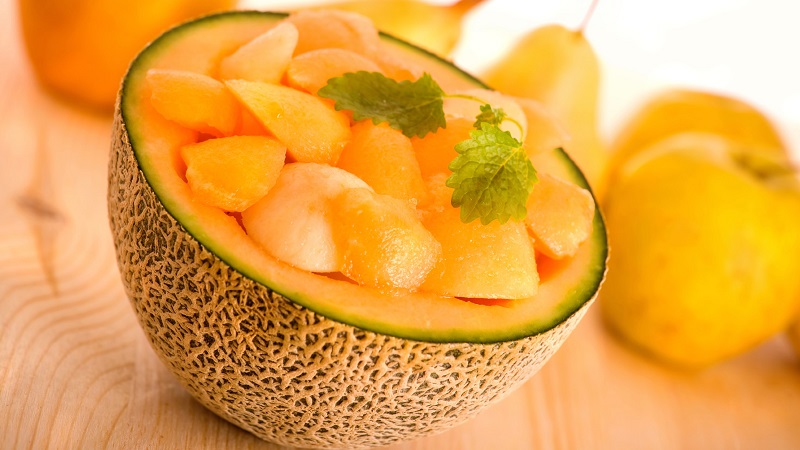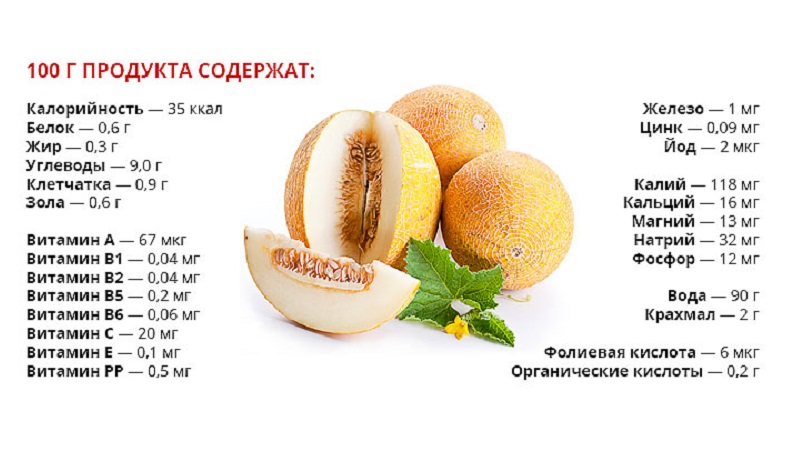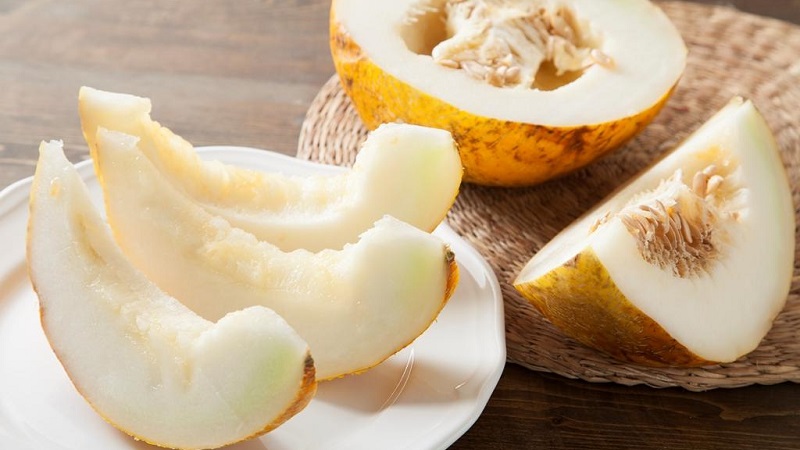What vitamins are in melon and how is it useful for the body
The sweet, incredibly fragrant melon has been cultivated since time immemorial in Central Asia and China. It is one of the most ancient agricultural crops. By cultivating it for thousands of years, man has improved the taste of the fruit.
Melon, or Cucumis melo, belongs to the genus of cucumbers, the pumpkin family. According to the specifics of cultivation, the culture belongs to melons. This tasty and healthy dessert vegetable is highly valued for its rich composition and dietary properties.
The content of the article
Content of nutrients
It is possible to list the beneficial properties of melon for a long time. Its composition is very rich. In addition to vitamins, fruits contain easily digestible sugar, organic water, starch, proteins, fiber, pectins, potassium, magnesium, folic acid, phosphorus, calcium, silicon, organic acids.
Interesting fact. More than a hundred rare local varieties of this crop are cultivated in Uzbekistan.

Trace elements and other nutrients in the composition
What vitamins and minerals are contained in a melon? There are more of them in this fragrant fruit than in a watermelon. The composition of trace elements makes the culture one of the most useful. Juicy pulp is rich in iron and potassium salts:
- Iron supplies oxygen to tissues. The element is part of many enzymes and proteins that are necessary for metabolic processes.
- Potassium is responsible for the state of the nervous system, muscle cells, and provides acid-base balance.
Thanks to this, the product used in nutritional care diseases of the heart and blood vessels, anemia, liver and kidney diseases, and even rheumatism and gout.
Melon fruits are marked high silicon content... This trace element takes part in many physiological processes in the human body. Silicon is responsible for connective tissues, the condition of the walls of blood vessels, skin and hair. Without silicon, the cerebral cortex does not function properly. The work of the nervous system, intestines is disrupted.
Thanks to beta carotene, of which there is more in a melon than in carrots, the vegetable has a beneficial effect on the condition and color of the skin.
Magnesium in pulp, reduces the risk of heart disease, stroke and diabetes.
Important! There is more vitamin C in a melon than in other melons. It is a great helper in maintaining immunity in the fall.
Fruits are also rich in vitamins A, E, PP, group B, folic acid.

The content of nutrients in the pulp and peel
The melon pulp is very aromatic and sweet. Large amount of easily digestible sugarscontained in it, gives the body a lot of energy and improves mood. The improvement in the emotional state after eating a dessert vegetable is explained by the fact that it contains amino acids - the precursors of serotonin, the hormone of joy.
Useful substances are found not only in the pulp, but also in the melon rind... The peel of this dessert vegetable contains such a useful substance as chlorophyll. It strengthens the circulatory system, delivers oxygen to the cells of the body, promotes wound healing and maintenance of hormonal balance, and improves the functioning of the digestive system.
The peel of the fruit is rich in the amino acid citrulline... This substance improves blood circulation through the small capillaries. The essential oils in the peel enhance the health benefits of the melon.
Council. Apply melon peels to bruises. This will help them heal faster.
Changes in composition during heat treatment
Many delicious dishes are prepared from melon fruits. Jam, jams, jam, marmalade are made from the pulp. Jam is also made from the peels, candied fruits and compotes are made.

The greatest benefit to the body is brought by the use of the product fresh... Heat treatment destroys some of the vitamins and nutrients, such as folic acid, vitamins A and C, B vitamins, carotene.
It can be useful:
The nutritional value
The energy value of the melon is worth mentioning separately. The calorie content of the product depends on the variety and on average ranges from 33 to 60 kcal per 100 grams. Therefore, it is shown to absolutely everyone, including people who are obese. However, it is worth remembering that melon whets the appetite.
The ratio of proteins, fats and carbohydrates in fruits explains the dietary properties of the product. 100 grams contains 90 g of water, 0.6 g of protein, 0.3 g of fat and 7.4 g of carbohydrates.
However fresh and, for example, dried melon are not the same... The calorie content of the dried product is significantly higher - about 334 kcal per 100 grams. Not to mention preserves, candied fruits and jams. Due to the high amount of sugar, these foods are no longer considered dietary.
Benefit and harm
Due to its high potassium and magnesium content, melon is good for the cardiovascular system... The walls of blood vessels are strengthened, tissues are saturated with oxygen. The product is recommended for the prevention and treatment of atherosclerosis.
The pulp has a diuretic effect, therefore it is useful for numerous kidney diseases.
Eating melon helps to normalize the digestion process and water exchange in the body. Melon juice removes excess water and has a pronounced anthelmintic effect.
Potassium, which is found in large quantities in vegetables, improves the functioning of the nervous system... And amino acids, the precursors of the hormone of joy serotonin, help fight stress and depression, and improve mood.
Melon is high in fiber. Pectin fibers make the intestines work actively, improve peristalsis and promote the absorption of food.
Melon juice is also a wonderful cosmetic product. Its beneficial properties are often used in the treatment of various dermatoses and rashes, allergies and even psoriasis - it has such a beneficial effect on the appearance of the skin.
However, even in such a large barrel of honey there is a fly in the ointment. Melon contains a large amount of easily digestible sugar... Therefore, people with diabetes are allowed to consume it only in small quantities.
Carefully include melon in the diet of those who suffers from peptic ulcers and liver pathologies. The same goes for breastfeeding women. Abuse of sweet fruits leads to indigestion in the baby and mother.
Melon benefits for women, men and children
Melon has a beneficial effect on the entire body... But it is worth mentioning separately the benefits of this product for women.
The fruits contain a large amount of folic acid, necessary for the female body during pregnancy and during menopause. And in combination with silicon, folic acid normalizes hormones, improves mood, and increases immunity. Due to the high content of vitamins and minerals, the sweet fruit helps to maintain the beauty of the skin and hair.
Read also:
Melon is no less useful for men... Its seeds improve potency and stimulate sperm production. The seeds are eaten fresh with honey.
Melon is good for children too... The mild laxative effect of the fruit helps to solve the problem of childhood constipation.
How to eat melon
The main rule of using melon fruits is not to mix them with any other products.... Melon is a self-sufficient product, its digestion is not an easy task for the body.
Need to know! Melon is best eaten 2 hours before or after the main meal.
The abuse of melon fruits leads to undesirable consequences. They are high in fiber, which activates the intestines. Therefore, the effect can be unpleasant. For the same reason after melon do not drink sour milk (kefir or yogurt) and cold water.
Note! Not recommended eat a melon on an empty stomach... This causes discomfort in the stomach, gas formation, and bloating.
An adult healthy person can eat without prejudice to well-being per day up to 1.5 kg of melon, dividing this amount into 2-3 doses. Melon should be used with extreme caution by children. Babies from one year old can be given no more than 100 grams per day.

Contraindications
Even such a healthy vegetable has certain limitations and contraindications. The danger lies in the fact that melon is a difficult product to digest..
People suffering from gastrointestinal diseases (gastritis, chronic colitis, gastric ulcer or duodenal ulcer) melon should be used with caution.
Patients with diabetes Due to the high content of easily digestible sugars in the pulp, it is allowed to eat the melon in small quantities.
Abuse of fruit is fraught with trouble... The sugar contained in the melon, when it enters the stomach, begins to ferment, causing flatulence, bloating and colic.
Conclusion
Melon is extremely tasty and healthy at the same time. When consumed separately from the main meals, this product provides health to the whole body and improves mood. The rich composition of vitamins and trace elements, a unique complex of minerals and organic acids helps to preserve beauty and youth.
Melon is a unique product both for men's health and for maintaining the beauty and youth of women. If you follow the recommendations for use, this product becomes the best summer dessert and a good helper for those who decide to arrange a fasting day for themselves.